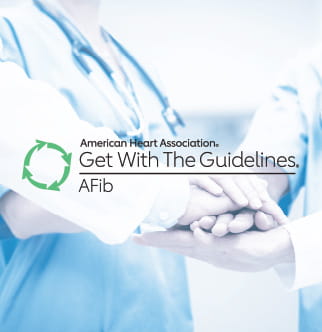National AFib Awareness Month

Reducing The Impact of AFib Together
The Importance of Improved Care
Without treatment, Atrial Fibrillation can lead to blood clots, stroke, heart failure, and other heart-related complications. Compared to people without, AFib patients experience:
- 5x increased risk of stroke
- 3x increased risk of heart failure
- 2x increased risk of dementia
Growing Numbers
Before the Covid-19 pandemic, AFib numbers in the US were on the rise. In 2001, experts predicted the number of Americans living with AFib would double by 2050. Today, those numbers are further exacerbated by the impacts of the virus. Research suggests AFib is likely to influence more Americans, and could put more people at greater risk of stroke and heart failure than previously expected.
AFib Awareness Toolkit
Included are tools to augment patient education, staff activities, and public awareness. By leveraging these resources, you're helping to improve AFib education and awareness in your professioinal and public communities.


Free Webinar
Ablation for Atrial Fibrillation 101
Monday September 23, 2024 | 11:00 AM - 12PM CST
Join us for an informative webinar featuring Dr. Jonathan P. Piccini as he addresses the basics of ablation therapy for atrial fibrillation as well as the indications for ablation in accordance with the new AFib guidelines.
Participants will gain an understanding of the indications and processes for ablation therapy for atrial fibrillation and the science behind ablation, exploring the mechanisms driving its efficacy.
Articles of Interest
Atrial Fibrillation Occurring During Acute Hospitalization
Racial/Ethnic & Sex Differences in Safety Outcomes & AFib-related Acute Healthcare Utilization After Catheter Ablation
Differences in safety and healthcare utilization after catheter ablation for AF were observed by race/ethnicity and sex groups. Underrepresented racial and ethnic groups with AF had a lower risk of AF/AFL-related acute healthcare utilization post-ablation.
Heart Disease & Stroke Statistics - 2024
This Statistical Update presents the latest data on a range of major clinical heart and circulatory disease conditions and the associated outcomes.
Plug In With Podcasts
Learn the importance of creating administrative buy-in, setting up an AFib clinic, and creating a multidisciplinary team to better treat patients and improve outcomes.

Three Things You Can Do Today
Consult the Data
Inquire with your quality improvement leaders, or dig into existing registries. Is your hospital seeing significant numbers of stroke and heart failure patients with AFib?
Talk to Your Cardiology Team
Three questions to ask:
- What is the AFib patient throughput?
- What AFib-specific protocols are used hospital-wide?
- Are patients receiving guideline directed therapy at discharge?
Raise Awareness
Share the materials and information found on this page. Consider emailing AFib Month information to internal stakeholders.
Distribute AFib-related education on your social media. Leading the conversation increases public education and improves understanding.

Get With The Guidelines® - AFib
Designed to assist hospital care teams in consistently providing the latest evidence-based treatment for their AFib patients. The program also offers a means of monitoring the quality of AFib care in U.S. hospitals to build a database for continued research and further quality improvement.